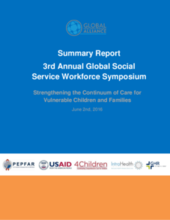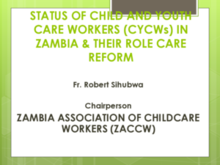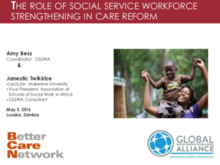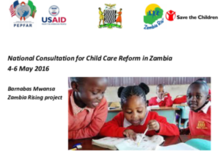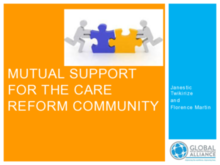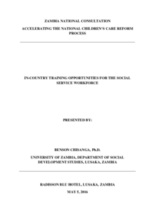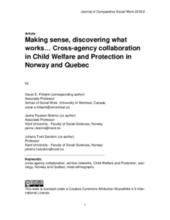Displaying 391 - 400 of 507
This research addresses the need to go deeper into the acquisition and consolidation of the core professional competences for running socio-educational groups with foster families.
This report includes a summary of each of the panel discussions at the symposium, as well as the questions asked, and provides the text of the opening and closing remarks from the event.
This report captures what has been accomplished in social service workforce strengthening in eight countries in Sub-Saharan Africa and highlights areas for future intervention. Progress made to strengthen the social service workforce within these countries is useful when reflecting on global trends and ways forward.
This presentation from Fr. Robert Sihubwa, Chairperson of the Zambia Association of Child Care Workers, given at the Zambia National Consultation to Accelerate Care Reform, provides an overview of the status of child care workers in Zambia and their role in, and contributions to, care reform.
This presentation by Amy Bess & Janestic Twikirize of the Global Social Service Workforce Alliance (GSSWA), given at the Zambia National Consultation to Accelerate Care Reform, presents a working paper by GSSWA and BCN on the role that building the capacity of social service workers has in reforming child care systems.
This presentation from the Zambia Rising project, given at the Zambia National Consultation to Accelerate Care Reform, highlights the two key challenges facing Zambia’s social work workforce that Zambian delegates have identified and outlines strategies for social workforce strengthening based on an HR assessment and gap analysis.
This presentation by Janestic Twikirize and Florence Martin of the Global Social Service Workforce Alliance (GSSWA) and Better Care Network (BCN) respectively, given at the Zambia National Consultation to Accelerate Care Reform, describes the work of both organizations and highlights the importance of mutual supporting in advancing care reform efforts.
This presentation from Benson Chisanga, of the University of Zambia’s Department of Social Development Studies, given at the Zambia National Consultation to Accelerate Care Reform, provides basic information on opportunities for the training of the social service workforce in Zambia, focusing on levels of training, challenges, and future prospects.
In this study, clinical program directors from 59 residential treatment facilities in the US responded to an online survey addressing the representation of adopted youth currently being served by their organization, the extent to which adoption issues are incorporated into clinical intake and treatment processes, and the training needs of clinical staff related to adoption.
This study seeks to understand collaboration dynamics in social services for determining what strategies work best in facilitating collaborative endeavors in specific policy and institutional environments.

